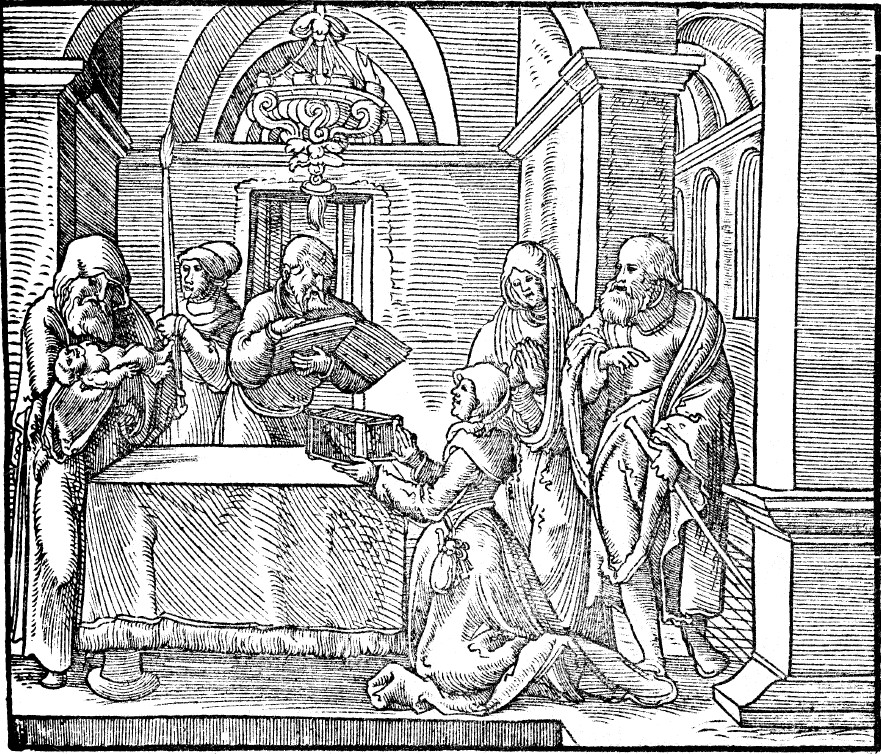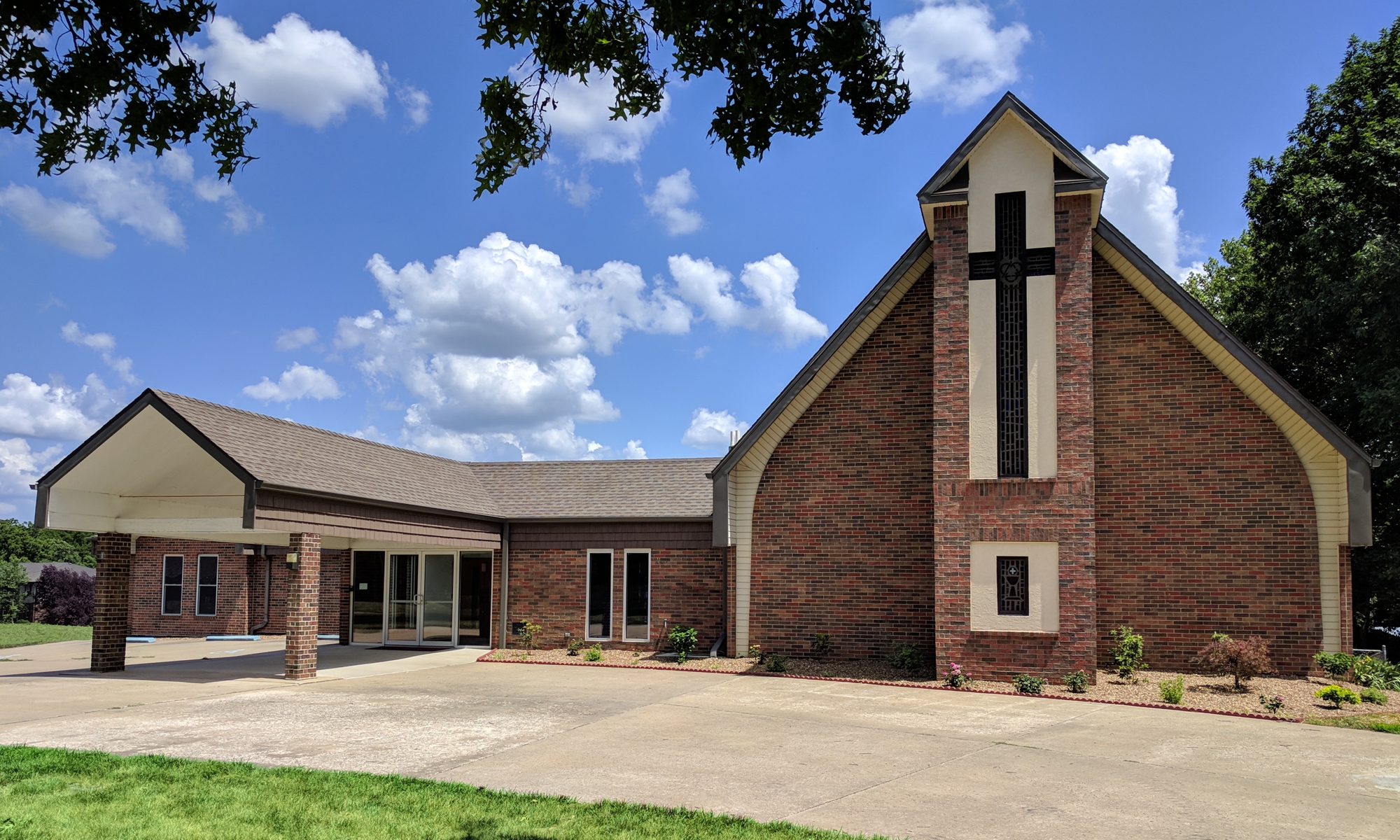
Lessons: Jeremiah 31:31-34, Galatians 4:1-7, Luke 2:22-240
Hymns: LSB 379, 372, 389, 376, 385
Grace, mercy, and peace to you from God our Father and our Lord and Savior, Jesus Christ. Amen.
Happy New Year!
What will this year bring? Many predictions are being made. Some predict WWIII. Some predict a recession. Some predict the closing of certain businesses or the advancement of others. Some predict new trends in fashion. Some, wisely, predict nothing. What unpredictable things will happen? This past year, many did not predict war in Europe, just as three years ago many did not predict a pandemic and lockdowns. We do not know what the future will bring in this life. But we do have hope and confidence in the Lord that He will use all things for the good of those who love Him (Rom. 8:28). We believe with unfailing hope that God will, at the right time, bring us to be with Him in glory, and that Jesus will return someday to judge the living and the dead, making all things new.
Somehow a man named Simeon was given word by the Holy Spirit that he will live to see the Lord’s Christ. After thousands of years of anticipation, it was finally happening—God coming in the flesh. The Christ Child will be born. He is coming to redeem the world—to save the world from sin, death, and the power of the Devil.
I wonder how many Christians in the Old Testament era wondered, as a new year began, if this will be the year Jesus comes into the world? I also wonder how many Christians today begin a new year wondering if this will be the year our Lord Jesus Christ returns in glory? While we wait patiently for His return, we also anticipate and prepare for His return, for we know that He will come back at a time many are not expecting Him.
We live in a time of great apathy—a time where many simply assume Jesus won’t come back soon. So they continue on with their carousing, drunkenness, lewdness, and sexual immorality.
I think the account with Simeon is significant as we enter a New Year for three reasons. First, he had been waiting for the consolation of Israel. Second, Simeon took Jesus up in his arms. Third, Simeon blessed God by speaking what we now call the Nunc Dimittis—words that have become important to us Christians upon receiving the Sacrament of the Altar.
First, Simeon has been waiting for the consolation of Israel. The Greek word here for consolation is παράκλησις, meaning “encouragement, comfort, or consolation.” Related to this word is the word Jesus uses when speaking of the Holy Spirit, παράκλητος, which means “one who helps, counsels, encourages, or mediates.” You see, when Jesus was sent into this world by God the Father, He certainly came to encourage, comfort, and console His people as He preaches the saving Word, performs miracles, and, above all, bears the world’s sin in His Body so He can reconcile us to our Father. Then He sends the Holy Spirit to direct our hearts and minds toward Christ, which is what the Holy Spirit has been doing in the Church since Pentecost. The Holy Spirit helps, counsels, encourages, and mediates as He brings Christ to our attention, works saving faith in us, applies to us the forgiveness of sins Jesus earned for us on the cross, and causes us to focus on Jesus—the author and perfector of our faith.
Just as Simeon awaited the appearance of the Savior of the Nations, so also, we look forward to our Lord’s coming as we enter this new year. Even if Jesus does not come back this year, we rejoice that He comes to us every week in the Sacrament, and He continually comes to us through His Word.
This comfort, or consolation of Israel— παράκλησις —is certainly found in the Word made flesh. I’d like to read to you a passages from Romans. Listen for this same Greek word which is translated as encouragement twice. The Holy Spirit writes through the Apostle Paul, “For whatever was written in former days was written for our instruction, that through endurance and through the encouragement of the Scriptures we might have hope. May the God of endurance and encouragement grant you to live in such harmony with one another, in accord with Christ Jesus, that together you may with one voice glorify the God and Father of our Lord Jesus Christ” (Rom. 15:4-6). This harmony and unity only comes about by the Holy Spirit as we hear and learn the Word of God.
Once Simeon had seen the Consolation of Israel in the flesh, Simeon took Jesus up into his arms. It is certainly not an uncommon sight to see people pick babies up with much joy. I have vivid memories of a Seminary professor doing this. Among the professors, someone had to come across as the most crochety and surly. Well, when this professor would see babies and toddlers, he would go up to them. At first, you’d wonder what harsh or sarcastic things he may say. But instead, he picks them up with great love and joy—and may even give them a kiss. He instantly turns into the happiest, gentlest, jolliest grandpa you could possibly find. It was amazing to witness.
Many, regrettably, think they own other people’s children. Many parents never get used to complete strangers sticking their faces into their baby’s strollers, touching their babies, and even picking them up. Of course, these people love children, but it can be a bit awkward when such strangers are cooing at babies as if they belong in the family. A word of advice is this—get permission from the parents before approaching or touching babies, especially if they are not your relatives, even if you know the family.
Anyway, here you have Simeon taking up Jesus into his arms. However, Simeon is not like those who get too close to little ones without permission. For the Greek word that is used for “took up” is usually translated as “receive” when Simeon took Jesus up in his arms. Simeon received Jesus. In fact, Jesus uses this same Greek word four times in Luke 9:48 when He Himself took up a child and put him by His side, declaring, “Whoever receives this child in My name receives Me, and whoever receives Me receives Him who sent Me.” May we, who have been baptized into Christ and received into His family, receive Jesus with great joy and gladness this entire year!
The Lord God is taken up by a man who beheld the One who could bring consolation to Israel. As we enter the New Year, let’s also take up Jesus. The first way we can do this is by listening to Him. The second way is to receive Him as He comes to us by Word and Sacrament. Another way is to honor Him with our conduct so that others will know that we are not just humans blending into the world, but we are Christians, having received Christ and His Word—redeemed by the Son of God and reconciled to our Father in Heaven.
Finally, having received Jesus in his arms, Simeon blessed God by saying, “Lord, lettest Thou Thy servant depart in peace.” You have learned these words by heart because they have made their way into the liturgy. We sing this song of Simeon upon receiving the Body and Blood of Jesus. Having received Jesus into our mouths, we, like Simeon, are now ready to depart in peace. We are ready to depart and be with the Lord, dying in peace. For our eyes have the salvation of Israel. Jesus has joined Himself to us in this Sacrament.
As graciously willed by the Lord, every Sunday this year the Lord’s Supper will be offered here at Grace. The Lord’s Supper will also be offered on a few services during the week, like Epiphany, Ash Wednesday, Maundy Thursday, and Ascension Day. The celebration of the Sacrament is certainly a high point in the life the Church. So is the celebration of Christmas. By singing Simeon’s song following the Lord’s Supper, we are also recalling events surrounding our Lord’s birth—in a sense, it is a celebration of Christmas. For through this Sacrament, we see that Jesus continues to be our Immanuel—God with us.
I think the New Year often reminds us of how frail we are, and how quickly life fleets away. Time flies by and soon we will return to the dust. But the word of the Lord endures forever (1 Peter 1:25). God’s love never ends. His mercies are new every morning. Great is our Lord’s faithfulness (Lam. 3:22-23).
And just as God and His Word are eternal, so also we shall live eternally. As the Lord wills, our bodies will return to the ground, but our souls will go to be with the Lord. And when Jesus returns on the great day of Judgment, our bodies will be raised to immortality and incorruption. Our resurrected human bodies will be glorious. Our souls and bodies will be reunited. We will be whole and complete in every way. Furthermore, God will recreate the Heavens and the Earth in perfection. And we will dwell with the Lord in this perfection to all eternity.
All this belongs to us because we have the peace of God, which was earned for us by the Prince of Peace. God and sinners are reconciled through Christ, the Lamb of God, who became our sin and died in our place. We are now children of God, beloved by Him.
No matter what happens in this world during the coming year, some things remain certain. God’s Word is truth. Christ Jesus lives. Our sins are atoned for. We belong to our loving, Triune God. And the peace of God is upon us. With His forgiveness, everlasting salvation belongs to us. Thanks be to God! Amen.
The peace of God which passes all understanding keep your hearts and minds in Christ Jesus to life everlasting. Amen

